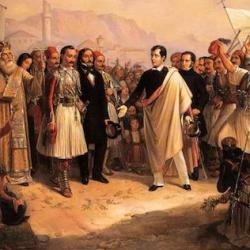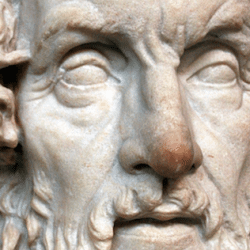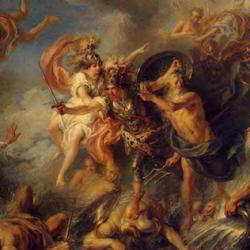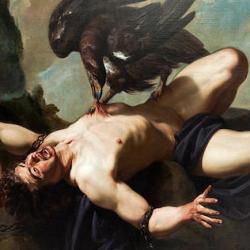If there was any doubt before, it has become very clear in recent scholarship that Greek mythology is indebted to Ancient Near Eastern predecessors. The most massively detailed treatment of this point in recent years is ML West’s The East Face of Helicon: West Asiatic Elements in Greek Poetry and Myth , from which the following points are taken.
We start with the obvious: In Mesopotamian, Ugaritic, Hittite, and Greek mythology, “the gods appear as a society of individuals, some male, some female, similar to human beings in form, speech, psychology, and social arrangements, but far surpassing them in power.” Each of the gods has a particular function or specialty: “the weather- or storm-god, the sun-god, the god of war, the goddess of love, a goddess . . . who delights in battle, a divine messenger, and a divine smith.” These gods have a chief, which in Greek is Zeus.
Not only is the general overview the same, but the titles are frequently reused.
“King of heaven” is a title for Anu and Marduk, and also for Zeus. Zeus is the “father of the gods” or “father of gods and men,” and so are Anu, Enlil, and Ea in Akkadian. El in Ugaritic is the “father of the sons of El.” Zeus is the “Lightner” and “Cloud-gatherer,” and so is the north Semitic weather-god Adad, as well as Baal. Enlil rdes the storm, as Zeus does. Baal is “rider of the clouds.” In Greek and ANE, the gods are divided into heaven and underworld, sometimes with earth’s surface given over to a variety of gods. Like Zeus, Marduk has not always been king. He became king of the gods several generations after the first gods emerged. In Greece as in the ANE, the gods assemble, often on mountains. Their appearance is marked by radiant light.
More specific parallels are evident when we compare the theogonic myths of the two cultures, Hesiod with the Song of Kumarbi and the Enuma elish. West summarizes: “In all three versions of the Succession Myth that we have considered we have found parallel sequences of gods: Anu, Kumarbi, Tessub; Anu, Ea, Marduk; Ouranos, Kronos, Zeus. In each case the first is the personified Sky, and the third, besides being the present king of the gods, has the character of a storm-god, or has absorbed a storm-god’s functions as part of his total person. As for the second, Kronos may perhaps be linked with Kumarbi as a corn or harvest deity, and with Ea as cunning and resourceful.”
The Song of Kumarbi is a Hittite version of the myth of the origin of the gods, and contains many different parallels with the Hesiodic theogony. As already noted, the sequence of gods is very similar to Hesiod. Anu and Ouranos are both castrated and removed from heaven. Other deities come from their genitals. Kumarbi has gods in his belly, including the storm god who will overthrow him. He states his intention to eat his son, as Kronos eats his children, but instead he receives a stone. The storm god eventually overthrows him. Likewise, the Babylonian Enuma elish has many parallels to Hesiod. As in Hesiod, there is a primordial father/mother, the cosmic waters (Apsu and Tiamat) in Enuma elish, and Heaven and Earth in Hesiod. They have children, and their father hats them. Ea takes action to overthrow Anu. There is no castration, but Anu is rendered impotent. Ea becomes the father of the eventual victor and chief god, Marduk.
The parallels are less evident in Homer, but they are there. In Book 15 of the Iliad , Poseidon tells the story of how the sons of Kronos divided the three-zone world among themselves my lots: Zeus and Poseidon and Hades; “All is shared out three ways: each has his due; I got the white-flecked sea to be my home/ when the lots were cast, Hades the misty dark / Zeus the wide heaven amid the airy clouds/ while in earth and Olympus all still have equal rights.” The same scene is found in the Atrahasis , an Akkadian epic: “They took the jar by the sides/ they cast the lot(s), the gods made their division/ Anu went up to the sky/ [Enlil took] the earth for his realm; the bolds, the trap-bars of the sea/ were established for Enki the wise chieftain.”











